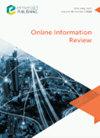A contribution-based indicator of research productivity: theoretical definition and empirical testing in the field of communication
IF 3.1
3区 管理学
Q2 COMPUTER SCIENCE, INFORMATION SYSTEMS
引用次数: 0
Abstract
Purpose The purpose of this article is to theoretically outline and empirically test two contribution-based indicators: (1) the scholars' annual contribution-based measurement and (2) the annual contribution modified h-index, computing six criteria: total number of papers, computed SCImago Journal Rank values, total number of authors, total number of citations of a scholar’s work, number of years since paper publication and number of annual paper citations.Design/methodology/approach Despite widespread scholarly agreement about the relevance of research production in evaluation and recruitment processes, the proposed mechanisms for gauging publication output are still rather elementary, consequently obscuring each individual scholar’s contributions. This study utilised the Technique for Order of Preference by Similarity to Ideal Solution method, and the authors built two indicators to value author's contribution.Findings To test both indicators, this study focussed on the most productive scholars in communication during a specific time period (2017–2020), ranking their annual research contribution and testing it against standard productivity measures (i.e. number of papers and h-index).Originality/value This article contributes to current scientometric studies by addressing some of the limitations of aggregate-level measurements of research production, providing a much-needed understanding of scholarly productivity based on scholars' actual contribution to research.基于贡献的研究生产力指标:传播领域的理论定义和实证检验
目的 本文旨在从理论上概述并实证检验两个基于贡献的指标:(Design/methodology/approach 尽管学者们普遍认为研究成果在评估和招聘过程中具有重要意义,但所提出的衡量发表成果的机制仍然相当初级,从而掩盖了每位学者的贡献。为了检验这两个指标,本研究以特定时期(2017-2020 年)传播学领域最有生产力的学者为研究对象,对他们的年度研究贡献进行排序,并与标准生产力指标(即论文数量和 h- 论文数量)进行对比检验。原创性/价值 这篇文章通过解决研究生产的总体测量的一些局限性,为当前的科学计量学研究做出了贡献,提供了基于学者对研究的实际贡献对学术生产力的亟需的理解。
本文章由计算机程序翻译,如有差异,请以英文原文为准。
求助全文
约1分钟内获得全文
求助全文
来源期刊

Online Information Review
工程技术-计算机:信息系统
CiteScore
6.90
自引率
16.10%
发文量
67
审稿时长
6 months
期刊介绍:
The journal provides a multi-disciplinary forum for scholars from a range of fields, including information studies/iSchools, data studies, internet studies, media and communication studies and information systems.
Publishes research on the social, political and ethical aspects of emergent digital information practices and platforms, and welcomes submissions that draw upon critical and socio-technical perspectives in order to address these developments.
Welcomes empirical, conceptual and methodological contributions on any topics relevant to the broad field of digital information and communication, however we are particularly interested in receiving submissions that address emerging issues around the below topics.
Coverage includes (but is not limited to):
•Online communities, social networking and social media, including online political communication; crowdsourcing; positive computing and wellbeing.
•The social drivers and implications of emerging data practices, including open data; big data; data journeys and flows; and research data management.
•Digital transformations including organisations’ use of information technologies (e.g. Internet of Things and digitisation of user experience) to improve economic and social welfare, health and wellbeing, and protect the environment.
•Developments in digital scholarship and the production and use of scholarly content.
•Online and digital research methods, including their ethical aspects.
 求助内容:
求助内容: 应助结果提醒方式:
应助结果提醒方式:


